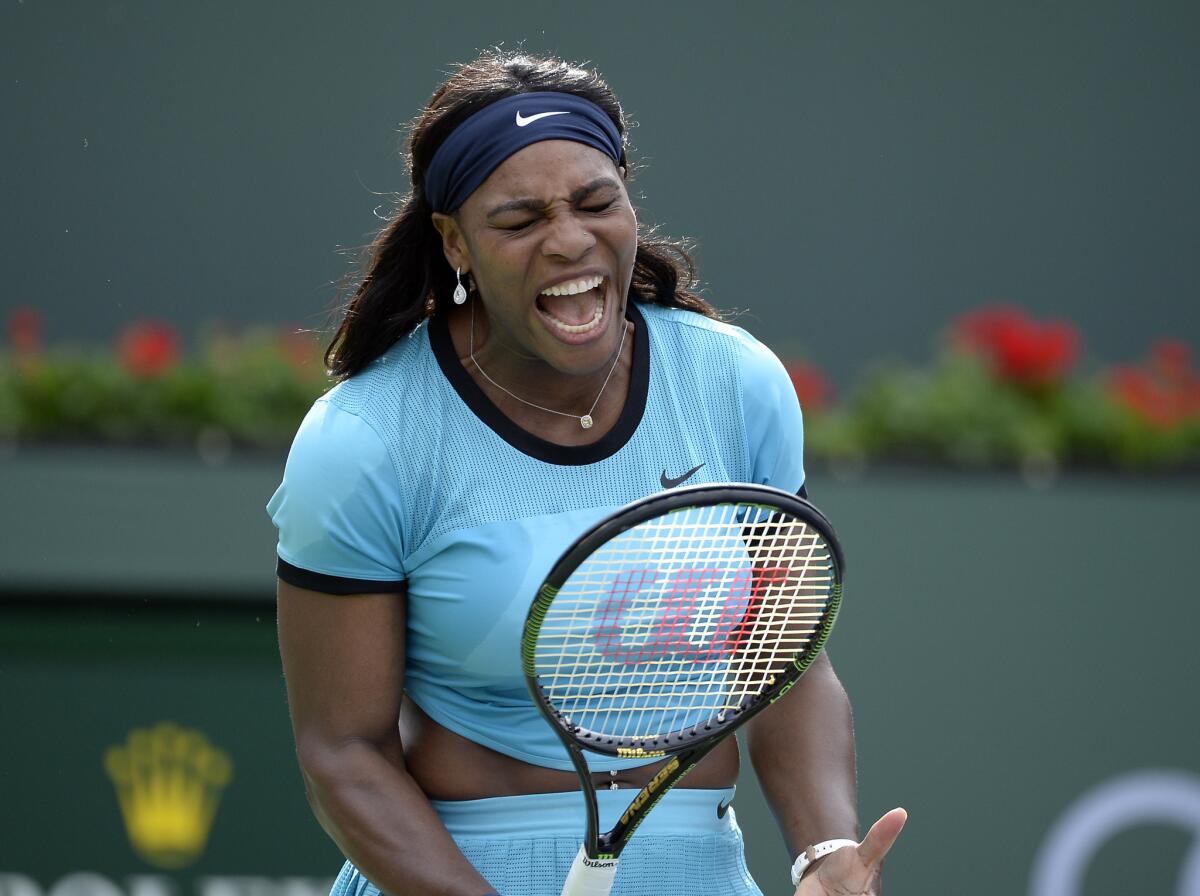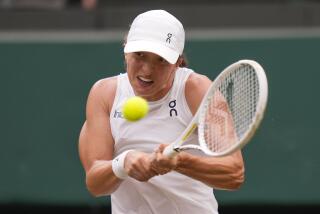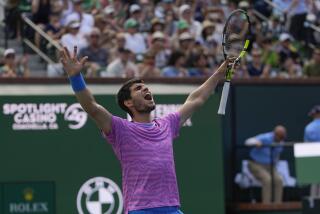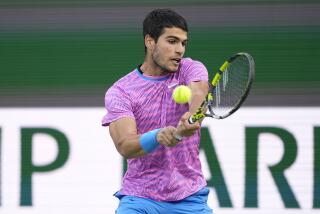Serena Williams, Novak Djokovic are delayed but not denied in surprisingly tough wins at BNP Paribas Open

Serena Williams reacts after a point during her third round match against Yulia Putintseva at the BNP Paribas Open at Indian Wells.
- Share via
The harder they tried, the worse they seemed to play. And with every forehand they rifled into the net, with every shot that sailed off on long flights in the gusty winds, fans began to sense an upset could be unfolding Sunday at the BNP Paribas Open.
“I was trying my best to not get off to a slow start, then I got broken really early and I couldn’t manage to break back,” 21-time Grand Slam winner Serena Williams said of her third-round match against Kazakhstan’s Yulia Putintseva, whose deepest foray into a Grand Slam was her third-round appearance at the Australian Open earlier this year.
Williams wasn’t alone in experiencing frustration against a younger opponent who had nothing to lose and a reputation to gain by throwing everything at the No. 1 player in the world.
“I started awful,” Novak Djokovic said of his second-round match against American Bjorn Fratangelo, who is ranked 149th and hadn’t won a set against a top-50 player until he defeated No. 48 Teymuraz Gabashvili in the first round here.
“Today is one of those days where you don’t feel the ball well. You know, swirly conditions, and just being tough. Trying to win with experience and with toughness in the clutch moments. That’s what helped me to prevail.”
Forget finesse. First Williams, and later Djokovic, overcame early deficits on willpower, grit and muscle memory. Williams, with the crowd solidly behind her, regained her rhythm late in the first set and pulled out a 7-6 (2), 6-0 victory over Putintseva. Djokovic, battling and finally breaking Fratangelo after the fifth game in the third set went to deuce four times, emerged with a 2-6, 6-1, 6-2 triumph and a sense of relief.
“When you’re a top player, most of the matches that you play you’re a big favorite to win. You’re expected to always win straight sets, and those are all part of, I guess, that position and pressures and, you know, ambitions that you have, that people have from you,” he said. “The players just swing freely, and if they feel well, if they start well the match, then they can be very dangerous. That’s what happened today.”
Putintseva won the sixth game at love to take a 4-2 lead, and she pumped her fist when she earned points on an overhead and when Williams hit a return long, giving her a 5-3 lead.
“I made a lot of errors in that first set. I went for a lot and I usually make those, but I kept missing. Even in the first game,” Williams said.
Just about then, the crowd began spontaneous and rhythmic chants of “Let’s go Serena,” and Williams responded. After that, Putintseva had little chance.
“My intensity was higher and I started making my shots. I was going for it,” Williams said. “I just kept missing it either in the net or missing it out. Really, really close. I started making them, and then I started getting more confidence to continue to go for it, and that kind of helped me out.”
Her next opponent will be Kateryna Bondarenko of Ukraine, a three-set winner Sunday over compatriot Lesia Tsurenko in her return from a maternity break. Williams has a 2-0 career record against Bondarenko, though they haven’t played since 2009.
Avoiding another slow start is part of Williams’ strategy.
“It’s my thing, I guess,” she said. “I don’t try to start slow. I don’t know if I have my whole career. I know last year I had a lot of slow starts, but I feel like I have done better this year. . . . It just goes to show there is always something I can improve on. I’m always looking to improve on things.”
Djokovic was asked who his biggest threat will be the rest of the tournament, but he wasn’t looking beyond his next opponent, Philipp Kohlschreiber. He noted that the 32-year-old German had lost only one game Sunday in defeating American Denis Kudla and has been playing well.
But his opponents’ form might matter less than Djokovic’s own ability to tough out a match the way he and Williams did on Sunday.
“I have to kind of try and focus on my own hurdles to overcome,” he said, “and then think about the rest of the tournament.”
Twitter: @helenenothelen
More to Read
Go beyond the scoreboard
Get the latest on L.A.'s teams in the daily Sports Report newsletter.
You may occasionally receive promotional content from the Los Angeles Times.










